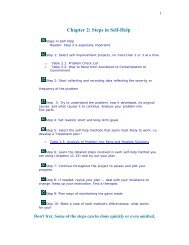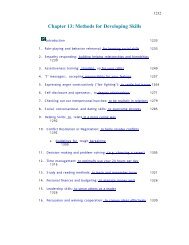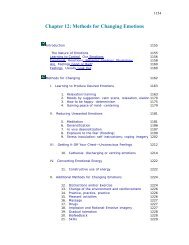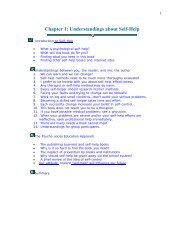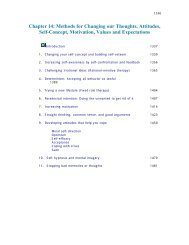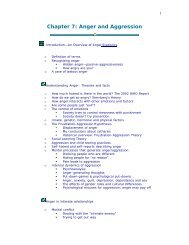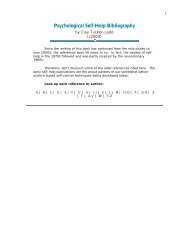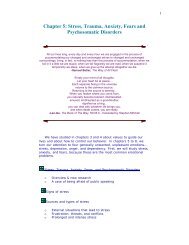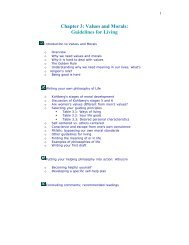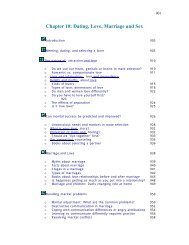Methods for Changing Behaviors - Psychological Self-Help
Methods for Changing Behaviors - Psychological Self-Help
Methods for Changing Behaviors - Psychological Self-Help
Create successful ePaper yourself
Turn your PDF publications into a flip-book with our unique Google optimized e-Paper software.
situations. Examples: the same social interaction skills are used with<br />
new friends as with old ones, even though the new friends are much<br />
more into athletics (or community service) than the old friends. Your<br />
ordinary social skills are all you need to become a Candy Striper at a<br />
hospital or a volunteer at a local nursing home; yet, your life might<br />
change. The task is to put those old skills to new uses.<br />
STEP THREE: Develop self-instructions that guide the initiation<br />
and carrying out of the desired behavior.<br />
If you think about it, a new behavior (one that isn't habitual) is<br />
ordinarily linked with thoughts that tell the behavior when to start,<br />
how to proceed, when and how to stop, and so on. We have a "coach"<br />
inside our head. Thus, changing behavior might more accurately be<br />
described as self-instruction modification. There is a therapy approach<br />
called Cognitive Behavior Modification. Donald Meichenbaum (1977)<br />
has developed and summarized many of the techniques using self-talk.<br />
Our self-talk both guides our behavior and explains and evaluates the<br />
outcome (see Attribution theory in chapter 4). It is our awareness and<br />
our thoughts. Consider this example of uninsightful thinking and much<br />
more aware and self-guiding thinking by an overeater:<br />
Uninsightful thinking Insightful thinking<br />
I don't have the will power to<br />
cut down on my eating.<br />
My life is so dull. I deserve a<br />
good meal in the evening.<br />
A small steak and a bowl of<br />
ice cream later won't matter.<br />
No one is ever going to be<br />
interested in me, any how.<br />
1079<br />
Stop giving yourself excuses. Will power has<br />
nothing to do with it; you just don't plan<br />
what you will eat and you haven't yet<br />
controlled your environment. Let's get<br />
healthy!<br />
Another self-con! Come on, all this weight is<br />
no fun. I don't look good; I have high blood<br />
pressure; I'm lonely. I deserve the more fun<br />
and health I'd have if I lost weight.<br />
You are kidding yourself again. That is what<br />
you said last night. It does matter; this<br />
eating has to stop. Why not now?<br />
What a pessimist! That kind of thinking is<br />
ruining our life. Come on, let's go to aerobics<br />
and have a cup of yogurt afterwards.<br />
This is how we control ourselves much of the time--we talk to<br />
ourselves. We know when our thinking is leading down the wrong<br />
path. We can recognize excuses, rationalizations, depressive, and selfdefeating<br />
thinking, and then we can correct those thoughts. As a<br />
result, our behavior is much more reasonable and results in our<br />
reaching more of our highly valued long-range goals in life. Become<br />
mindful of your mind.<br />
How else can we use self-talk? Let's suppose we wanted to become<br />
less shy and there was a particular person we would like to get to



